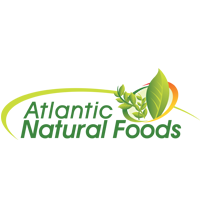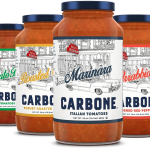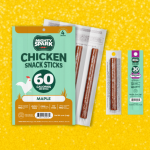Above Food Acquires Atlantic Natural Foods
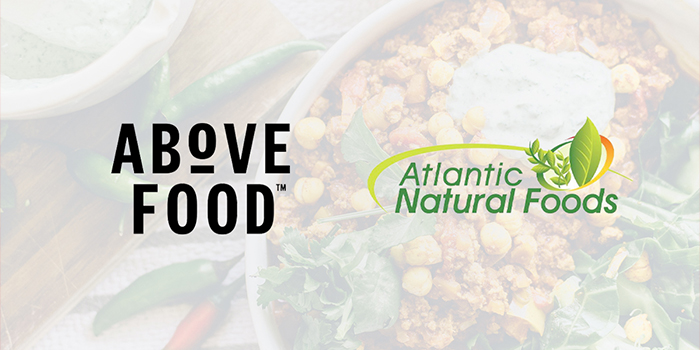
Canadian plant-based food company Above Food announced today its acquisition of Atlantic Natural Foods, including alt-protein brands Loma Linda and Neat, from AFT Holdings. The deal, valued at over $30 million, will grow the new company’s shelf-stable alternative protein offerings while allowing Atlantic Natural access to its vertically integrated plant-based protein supply chain.
The deal concludes a multi-year search by Atlantic Natural for a partner that can assist with extending the shelf-life of its products, which are sold across 25,000 points of distribution in over 30 countries, and improving the functionality of its ingredients, according to chairman Douglas Hines.
“We’ve been looking for two years for some type of partnership with someone that can bring something other than venture capital,” Hines said. “To be successful long term, you have to be able to manage from the total operation on the ground, all the way through the supply chain.That’s what really drove our decision.”
Developed initially as a joint venture with Bumble Bee Foods focused on manufacturing, Atlantic Natural, a division of AFT Holdings, has since expanded to include a range of CPG brands including meat alternative brand Loma Linda, tuna analog maker TUNO, egg replacement brand Neat and instant coffee maker Kaffree Roma. Its foodservice business, Modern Menu, and its manufacturing facilities in Nashville, North Carolina and Bangkok, Thailand, were also included in the deal. Hines is set to join Above Food to lead its plant-based seafood division while Kelly Krause will serve as chief innovation officer.
Launched last year, Above Food has tapped into its co-founders respective areas of expertise, combining CEO and executive chairman Lionel Kambeitz’s background in agriculture through his fourth-generation family farm in Canada and president and chief innovation officer Martin Williams experience as a CPG investor and advisor. The company has acquired legume brand Farmer Direct Organic, oats producer Only Oats and plant-based cheese maker Culcherd. It also internally developed and launched Eat Up!, which spans plant-based meat and bakery items, with cheese alternatives and baby food also in the works.
According to Williams, Above Food’s mission focuses on three pillars of sustainability: regenerative agriculture, traceability and nutrient density. The company follows what it calls a “custody model,” using a vertically integrated “seed-to-fork supply chain” that spans from harvesting to manufacturing and distribution. It utilizes ingredients like soy, chickpeas, lentils and oats grown in the Northern plains of the U.S. and southern prairies of Canada and through proprietary technology creates “value-added formulations” like high-density flours and protein isolates and concentrates. These ingredients are used by its own brands as well as sold to other CPG companies, Williams said.
“The differentiation that’s really baked into our supply chain isn’t just the fact that we’re completely vertically integrated — it’s the fact that because we’re vertically integrated, we have different decisions that we’re able to make,” he noted. “We get to make better decisions, because we own the entire supply chain, which in plant-based is very unique.”
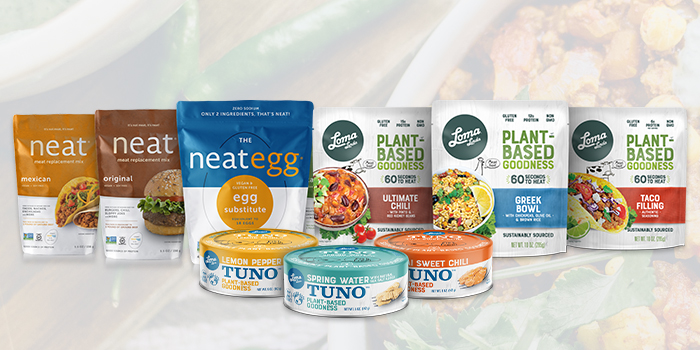
Hines acquired Atlantic Natural through AFT Holdings in 2009. At the time a co-packer for alternative meat brands, Atlantic Natural was originally formed via a joint venture between seafood company Bumble Bee, where Hines was formerly the COO, and Castleberry Foods. In 2014, AFT began growing its Atlantic Natural’s portfolio, acquiring coffee alternative Kaffree Roma, Loma Linda (a co-packing client since 2008) and the licensing rights for Worthington Foods from the Kellogg Company, which had originally purchased the brand and its sister brand Morningstar Farms in 1999 for $307 million. Atlantic Naturals ultimately transitioned Worthington into the Loma Linda brand through its Traditions line of canned alt-protein products, which Above Food said it plans to continue to produce and distribute.
Atlantic Natural continued to build out its roster over the last half-decade, acquiring shelf-stable egg and meat replacement Neat in 2015 and in launching tuna-alternative TUNO under the Loma Linda brand in 2018. AFT also still continues to hold several real estate and tech investments.
Atlantic Natural was an attractive acquisition because it “had built a portfolio reflective of where the market is going,” Williams said, with shelf-stable products offered at approachable price points.
“We’re not thinking about how to steal share from some of the incumbents in the plant-based world, we’re talking about how we source volume from [the dairy and meat] industries, and one of the clearest ways is unit economics,” Williams said. “How do you bring the price of plant-based foods from something that’s a novelty that some people will trial to such that it gets into their cart every week?”
Loma Linda and TUNO have seen several rebrands and reformulations over the years, including a new TUNO formula rolled out last month with seaweed and algal oil and the second rebrand for Loma Linda in three years. Williams said these changes ultimately mark an adaptive company adjusting to a maturing market and new consumers, and Above Food will “continually improve” its products as food tech advances.
The Atlantic Natural acquisition is also set to expand the range of offerings in Above Food’s new digital marketplace, which debuted last month. Williams hopes the platform can become “one-stop shop for plant-based consumers” by stocking products from Above Food’s brands Eat Up!, Farmer Direct Organic, Only Oats and Culcherd. Focusing on ecommerce to start has given the company a leg up by gaining insights into consumer purchasing behaviors and testing new products, he added.
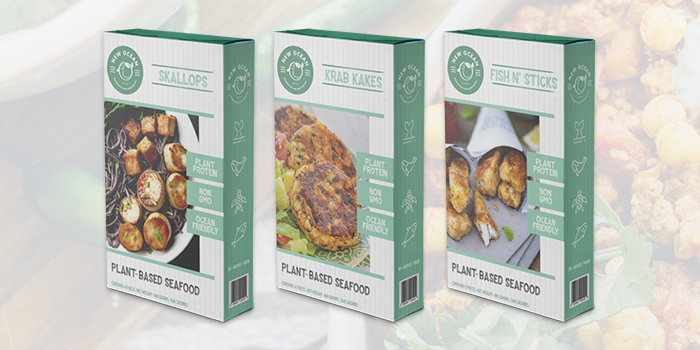
Above Food is particularly eyeing the seafood analog space, where Kambeitz noted there’s “room for a champion.” TUNO will be rebranded under Above’s own New Ocean brand, which has yet to launch but will also have frozen Skallops, Krab Kakes and Fish N’ Sticks starting in early 2022.
Williams said the company is looking at opportunities for M&A activity while simultaneously planning to launch additional in-house brands.
“It’s informed as much by our supply advantage as it is from new insights that we’re gleaning from the market,” he said. “In instances where we think we can get a product to market quicker that we don’t see an opportunity to acquire a business, we’ll develop it ourselves. It always comes back to a build versus buy decision — that’s really the litmus test.”
After closing a $40 million round in January, Kambeitz said Above Food will likely raise between $125 million to $200 million in an upcoming funding round before looking to go public through an IPO or SPAC in the next year or two. In the short term, the company hopes to use the funding to make investments in food tech, improving the quality and functionality of its ingredients.
“This is what we believe the future of the plant based food industry is, but it’s actually very reflective of what the history of food was when General Mills first launched,” Williams said. “It was a mill, and it needed to be to own its own supply chain. As we think about what we’re doing, we’re really referencing models from the past and bringing them forward into the plant-based market.”
